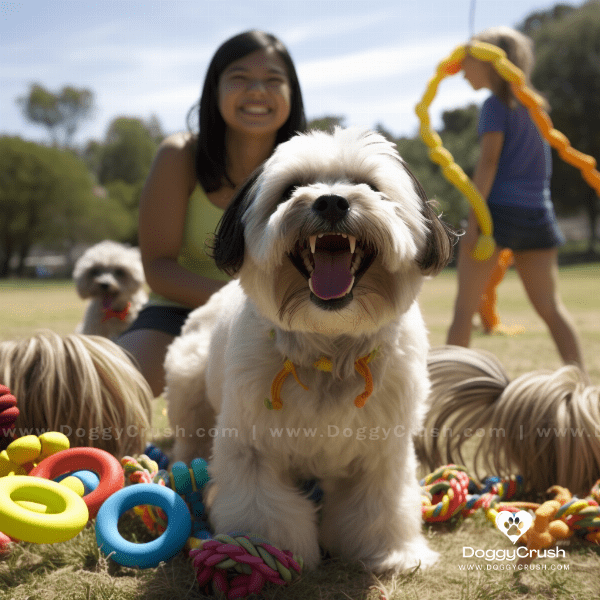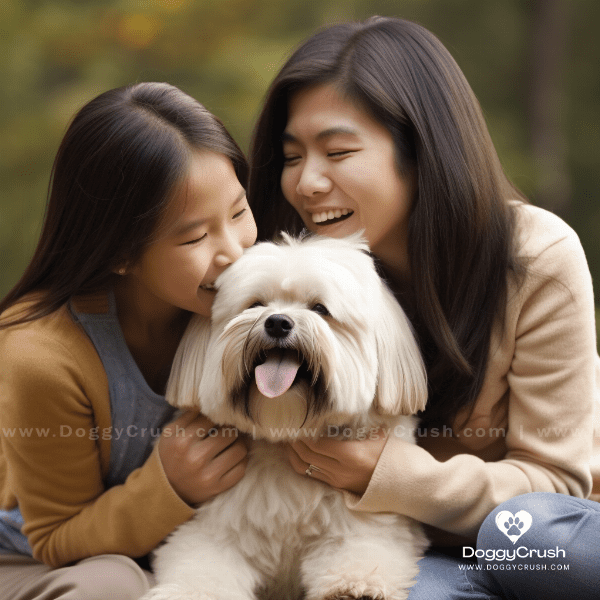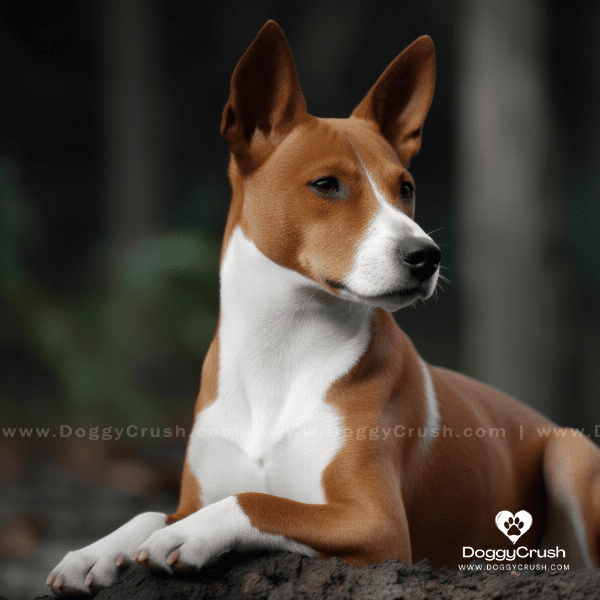Table of Contents
- The History of Lhasa Apso Dogs
- Characteristics and Appearance of Lhasa Apso Dogs
- Lhasa Apso Dogs’ Temperament and Personality Traits
- Proper Care and Grooming for Lhasa Apso Dogs
- Training and Exercise for Lhasa Apso Dogs
- Health Concerns for Lhasa Apso Dogs
- Lhasa Apso Dogs as Family Pets
- Lhasa Apso Dogs in Popular Culture
- Finding the Perfect Lhasa Apso Dog for You
- Conclusion: The Enduring Charm of Lhasa Apso Dogs
The History of Lhasa Apso Dogs
The Lhasa Apso is a small, long-haired breed that originated in Tibet. These dogs were highly valued as companions and protectors by Buddhist monks in the Himalayan region. They were considered sacred and were often given as gifts to those of high rank.
Origins of the Lhasa Apso
The Lhasa Apso’s origins date back more than a thousand years. It is believed that the breed developed in the sacred city of Lhasa, Tibet, where it was revered as a guardian of temples and palaces. The Lhasa Apso’s long, flowing coat helped protect it from the harsh Himalayan climate and predators.
The Lhasa Apso as a Symbol of Good Luck
The Lhasa Apso was also considered a symbol of good luck in Tibet. The breed was believed to bring good fortune and prosperity to its owners. In fact, it was common for Lhasa Apsos to be given as gifts to visiting dignitaries or as tokens of appreciation to allies.
Introduction of the Lhasa Apso to the Western World
The Lhasa Apso was first introduced to the Western world in the early 1900s. It was not until the 1930s, however, that the breed began to gain popularity in the United States and Europe. In 1933, the Lhasa Apso was officially recognized by the American Kennel Club.
Modern-Day Lhasa Apso Dogs
Today, Lhasa Apsos continue to be popular as family pets and companions. They are known for their loyalty, intelligence, and affectionate personalities. While they no longer guard temples or palaces, Lhasa Apsos remain highly valued and beloved by their owners.
Overall, the Lhasa Apso’s rich history and unique cultural significance make it a fascinating breed to learn about and appreciate. Whether you are a dog lover or simply interested in the history of different cultures, the Lhasa Apso’s story is one worth exploring.

Characteristics and Appearance of Lhasa Apso Dogs
Lhasa Apsos are small, sturdy dogs that are known for their distinctive appearance and charming personalities. Here are some of the key characteristics that make this breed so unique:
Physical Characteristics
Lhasa Apsos have a compact, square build, with a height of around 10 to 11 inches and a weight of up to 18 pounds. They have a long, flowing coat that can be a variety of colors, including black, white, gold, or a combination of these colors.
One of the most striking features of the Lhasa Apso is its head. These dogs have a broad skull and a long, flowing beard that frames their face. Their large, dark eyes are set deeply in their sockets, giving them an expressive and intelligent appearance.
Temperament and Personality Traits
Lhasa Apsos are known for their loyalty, intelligence, and independent nature. They are affectionate with their owners but can be wary of strangers. These dogs are often described as “big dogs in small bodies” because they are fearless and have a strong protective instinct.
Despite their small size, Lhasa Apsos are also known for their tenacity and courage. They have a reputation for being tough little dogs who will stand their ground when necessary. However, they are also known to be sensitive and can become upset if they feel they are not getting enough attention or affection.
Exercise and Training Needs
Lhasa Apsos are active dogs that require daily exercise and mental stimulation. They enjoy walks, playtime, and interactive games with their owners. They are also intelligent dogs that respond well to positive reinforcement training methods.
Because of their independent nature, Lhasa Apsos can be challenging to train. However, with patience and consistency, they can learn a variety of commands and tricks. Early socialization is also important for these dogs to ensure they are comfortable around other people and animals.
Overall, the Lhasa Apso’s unique appearance and charming personality make it a beloved breed among dog owners. Whether you are looking for a loyal companion or a fun and active pet, the Lhasa Apso is a great choice for many families.

Lhasa Apso Dogs’ Temperament and Personality Traits
Lhasa Apsos are known for their unique personality and temperament. Here are some key traits that define this breed:
Independent Nature
Lhasa Apsos are independent dogs that can be stubborn and strong-willed. They have a reputation for being somewhat aloof with strangers, preferring the company of their owners. However, they are also loyal and devoted to their families and make excellent watchdogs.
Intelligence and Trainability
Lhasa Apsos are intelligent dogs that can be trained to perform a variety of tasks. They respond well to positive reinforcement training methods and enjoy learning new things. However, they can be strong-willed and require a patient and consistent approach to training.
Protective Instinct
Lhasa Apsos have a strong protective instinct and are known for their courage and tenacity. They are not afraid to stand up for themselves or their families, making them excellent watchdogs. However, their protective nature can also lead to aggression if they feel threatened or uncomfortable.
Sensitivity
Lhasa Apsos are sensitive dogs that can become upset if they feel they are not getting enough attention or affection. They are also sensitive to changes in their environment and may become anxious or stressed in new situations.
Overall, the Lhasa Apso’s unique personality and temperament make it a beloved breed among dog owners. While they can be challenging to train, their affectionate nature and playful personality make them great companions for those who are willing to put in the effort to properly train and care for them.

Proper Care and Grooming for Lhasa Apso Dogs
Lhasa Apsos require regular care and grooming to maintain their health and appearance. Here are some key tips for caring for your Lhasa Apso:
Grooming Needs
Lhasa Apsos have a long, flowing coat that requires daily brushing to prevent matting and tangling. They also require regular baths to keep their coat clean and healthy. It is important to use a high-quality dog shampoo that is specifically formulated for Lhasa Apsos’ sensitive skin.
In addition to regular brushing and bathing, Lhasa Apsos also require routine grooming, including nail trimming and ear cleaning. It is important to keep their nails trimmed to prevent them from becoming too long and causing discomfort or injury. Regular ear cleaning can also help prevent ear infections, which are common in this breed.
Nutrition and Health Needs
Lhasa Apsos require a high-quality, balanced diet that is rich in protein and other essential nutrients. It is important to feed them a diet that is appropriate for their age, weight, and activity level. Regular visits to the veterinarian are also important to maintain their health and prevent common health issues in this breed, such as dental problems and eye issues.
Living Environment
Lhasa Apsos are adaptable dogs that can live in a variety of living environments. However, they do best in homes with a consistent routine and a calm, quiet atmosphere. They are sensitive to changes in their environment and may become anxious or stressed in chaotic or unpredictable situations.
Overall, proper care and grooming are essential for maintaining the health and well-being of your Lhasa Apso. With a little bit of effort and attention, these charming little dogs can live happy, healthy lives as beloved family pets.

Training and Exercise for Lhasa Apso Dogs
Lhasa Apsos are active and intelligent dogs that require daily exercise and mental stimulation. Here are some key tips for training and exercising your Lhasa Apso:
Positive Reinforcement Training
Lhasa Apsos respond well to positive reinforcement training methods. This means using rewards and praise to reinforce good behavior, rather than punishment or scolding. Training sessions should be short and consistent, and it is important to be patient and consistent with your Lhasa Apso.
Socialization
Socialization is important for all dogs, but especially for Lhasa Apsos. Because they can be wary of strangers, it is important to expose them to a variety of people and situations from a young age. This will help them become comfortable and confident in different environments.
Exercise
Lhasa Apsos require daily exercise and activity to maintain their physical and mental health. They enjoy walks, playtime, and interactive games with their owners. However, it is important to avoid over-exercising them, as they are prone to respiratory problems and can become easily overheated.
Mental Stimulation
In addition to physical exercise, Lhasa Apsos require mental stimulation to prevent boredom and destructive behavior. Interactive toys, puzzle feeders, and training games can help keep them mentally engaged and entertained.
Obedience Training
Obedience training is important for Lhasa Apsos to help them learn basic commands and behaviors. This can include commands such as sit, stay, come, and leave it. Consistent training and reinforcement can help prevent problem behaviors and ensure that your Lhasa Apso is a well-behaved and obedient pet.
Overall, training and exercise are essential for maintaining the health and happiness of your Lhasa Apso. With patience, consistency, and positive reinforcement, you can help your Lhasa Apso become a well-behaved and well-rounded companion.

Health Concerns for Lhasa Apso Dogs
Like all Dog breeds, Lhasa Apsos are prone to certain health concerns. Here are some common health issues to be aware of if you are considering adding a Lhasa Apso to your family:
Respiratory Problems
Lhasa Apsos are brachycephalic dogs, which means they have a flat face and shortened snout. This can make them prone to respiratory problems, such as snoring, wheezing, and difficulty breathing. It is important to monitor your Lhasa Apso’s breathing and avoid over-exercising them in hot or humid weather.
Dental Problems
Lhasa Apsos are also prone to dental problems, such as periodontal disease and tooth decay. Regular dental care, including daily brushing and routine professional cleanings, can help prevent these issues.
Eye Issues
Lhasa Apsos are also prone to certain eye issues, including dry eye, cataracts, and progressive retinal atrophy. Regular eye exams can help detect and treat these issues before they become more serious.
Skin Allergies
Lhasa Apsos can also be prone to skin allergies, which can cause itching, redness, and discomfort. It is important to monitor your Lhasa Apso’s skin and coat for any signs of irritation or allergy, and to work with your veterinarian to develop an appropriate treatment plan.
Orthopedic Issues
Lhasa Apsos can also be prone to orthopedic issues, such as luxating patellas and hip dysplasia. It is important to monitor your Lhasa Apso’s mobility and to seek veterinary care if you notice any limping, stiffness, or difficulty moving.
Overall, while Lhasa Apsos are generally healthy dogs, it is important to be aware of these common health issues and to work with your veterinarian to ensure that your Lhasa Apso receives appropriate preventative care and treatment. With proper care and attention, your Lhasa Apso can live a happy and healthy life as a beloved family pet.

Lhasa Apso Dogs as Family Pets
Lhasa Apsos make excellent family pets and are known for their affectionate personalities and loyal nature. Here are some reasons why Lhasa Apsos can be a great addition to your family:
Size and Adaptability
Lhasa Apsos are small dogs that are adaptable to a variety of living environments. They can live comfortably in apartments or small homes, and they are also comfortable in larger homes with yards. Their small size also makes them easy to travel with and take on trips.
Affectionate and Playful
Lhasa Apsos are known for their affectionate and playful personalities. They enjoy spending time with their owners and are always up for a game of fetch or a cuddle session. They are also great with children, as long as they are properly socialized and trained.
Loyal and Protective
Lhasa Apsos have a strong protective instinct and are loyal to their families. They make excellent watchdogs and will alert their owners to any potential threats or dangers. They are also fiercely protective of their families and will defend them if necessary.
Low-Shedding Coat
Lhasa Apsos have a long, flowing coat that is low-shedding, which makes them a good choice for those with allergies. However, their coat does require regular grooming and maintenance to prevent matting and tangling.
Long Lifespan
Lhasa Apsos have a relatively long lifespan, with an average life expectancy of 12-14 years. This means that they can be a long-term companion for families who are looking for a loyal and devoted pet.
Overall, Lhasa Apsos can make great family pets for those who are willing to provide them with proper care and attention. Their affectionate personality, loyal nature, and adaptability make them a great choice for families of all sizes and living situations.

Lhasa Apso Dogs in Popular Culture
Lhasa Apsos have been featured in a variety of popular culture mediums over the years. Here are some examples of Lhasa Apsos in popular culture:
Film and Television
Lhasa Apsos have appeared in several films and television shows over the years. In the 2000 film “Best in Show,” a Lhasa Apso named Miss Agnes was one of the featured dogs. Lhasa Apsos have also appeared in television shows such as “Sex and the City” and “Two and a Half Men.”
Literature
Lhasa Apsos have been featured in a variety of books and novels over the years. In the book “The Hundred Secret Senses” by Amy Tan, a Lhasa Apso named Kwan plays a prominent role in the story. Lhasa Apsos have also been featured in children’s books, such as “Bark, George” by Jules Feiffer.
Advertising
Lhasa Apsos have been used in advertising campaigns for a variety of products and services over the years. For example, Lhasa Apsos have been used in advertising campaigns for Purina dog food, as well as in print ads for fashion brands such as Louis Vuitton.
Art
Lhasa Apsos have also been featured in various works of art over the years. For example, artist Pablo Picasso owned a Lhasa Apso named Lump, who was the subject of several of his works.

Finding the Perfect Lhasa Apso Dog for You
If you are considering adding a Lhasa Apso to your family, it is important to do your research and find the right dog for you. Here are some tips for finding the perfect Lhasa Apso:
Research Breeder and Adoption Options
There are a variety of breeder and adoption options available for Lhasa Apsos. It is important to do your research and find a reputable breeder or adoption agency. Look for breeders who are registered with the American Kennel Club and who have a history of producing healthy, well-socialized puppies. Adoption agencies can also be a good option for those looking to adopt an older Lhasa Apso.
Consider Your Lifestyle
When choosing a Lhasa Apso, it is important to consider your lifestyle and living situation. Lhasa Apsos are adaptable dogs that can live in a variety of environments, but they do require daily exercise and mental stimulation. If you live in a small apartment or have limited outdoor space, you may need to provide your Lhasa Apso with additional indoor exercise options.
Meet the Dog
Before bringing a Lhasa Apso into your home, it is important to spend some time with the dog and get to know their personality. This can help ensure that the dog is a good match for your family and lifestyle. Ask the breeder or adoption agency if you can spend time with the dog before making a final decision.
Health Screening
It is important to ensure that the Lhasa Apso you choose has been properly health screened for common health issues, such as respiratory problems, dental issues, and eye problems. This can help prevent future health issues and ensure that your Lhasa Apso remains healthy and happy.
Commitment to Care
Finally, it is important to be committed to providing proper care and attention to your Lhasa Apso. This includes regular grooming and exercise, routine veterinary care, and proper nutrition. With the right care and attention, your Lhasa Apso can live a long and happy life as a beloved member of your family.
Overall, finding the perfect Lhasa Apso takes time and effort, but it is well worth it to find the right companion for you and your family.

Conclusion: The Enduring Charm of Lhasa Apso Dogs
Lhasa Apsos are a unique and beloved dog breed that have captured the hearts of dog lovers around the world. From their fascinating history to their affectionate personalities, Lhasa Apsos have many traits that make them a great choice for families and individuals alike.
Despite their small size, Lhasa Apsos have a big personality and are known for their loyalty and protective nature. They require regular grooming and exercise, but their low-shedding coat and adaptability make them a great choice for those with allergies or limited living space.
Lhasa Apsos have also made their mark in popular culture, appearing in films, television shows, books, and art over the years. Their unique appearance and personality make them a popular choice for artists, writers, and advertisers alike.
If you are considering adding a Lhasa Apso to your family, it is important to do your research and find the right dog for you. Whether you choose to adopt or purchase from a reputable breeder, it is important to be committed to providing your Lhasa Apso with proper care and attention.
Overall, Lhasa Apsos are a charming and beloved breed that have earned their place in the hearts of dog lovers around the world. Whether you are a first-time dog owner or an experienced dog parent, a Lhasa Apso can make a wonderful companion for you and your family.



